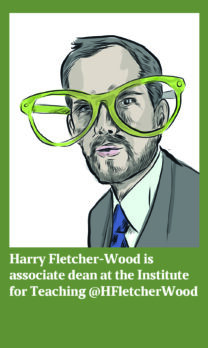Guest reviewer Harry Fletcher-Wood takes us through this week’s best education blogs.
Want to be a better teacher? Read something new every night by Toby French
We begin this month’s review, with Toby French, aka Mr Histoire, who writes that he has “just this moment realised that, due to my whack-a-mole reading habits, I read something new about history every single night.”
French describes the effects this has on lessons – he used what he had read one evening about the failure of collectivisation in Ukraine in 1931 the very next day, to help Year 9 “see similarities in the autocratic rule of Stalin and Hitler”.
French analogises reading to expanding his palette: “with each new shade I can – apparently without realising it – paint a new detail which better illustrates the past.” He concludes by advocating teachers “Read one thing new every night and share it the next day. Find an opportunity and actually say, “So, I read last night that x, y, z – isn’t that amazing?” It shows you’re learning, but also that you care about your subject and the world. Colour in your subject.”
Teaching for Mastery, Part 1. by Mark McCourt
Mark McCourt has written a long, fascinating discussion of mastery, which begins by looking at the work and findings of pioneers in the field, from Aristotle to Carleton Washburne – who took the only route out of penury he could find: “he reluctantly became a teacher”.
McCourt sets out the development of mastery learning, in theory and in practice, by unearthing such gems as Washburne’s achievements in Winnetka, and the less-well-known writing of Benjamin Bloom (of taxonomy fame. McCourt uses this review to offer clear definitions of the key aspects of mastery learning: diagnostic pre-assessment and pre-teaching, high-quality group-based instruction, progress monitoring, corrective instruction, further formative assessment, and enrichment and extension activities.
He also explains how they fit together (and even offers a diagrammatic summary).
This is a long read, but McCourt promises another 14,000 words on the subject in future posts: it will be well worth returning.
How proximity and trust are key factors in getting research to feed into policymaking by Jo Maybin
Where do government departments get their evidecen? Jo Maybin set out to answer these questions, spending eighteen months studying civil servants working on high-profile policies and legislation at the Department of Health. She found that attempts to capture research knowledge and organisational memory “in a formal document-based knowledge management system seemed to have been largely ineffective: the civil servants wanted to talk to the person, and not to read the notes they had logged on the system intended to serve that purpose.”
They wanted to talk to researchers, but “time pressure, combined with the delicate process of alliance building that constitutes policymaking, meant that authority, proximity and trust were key implicit criteria when it came to selecting which individuals to speak to.”
The key feature individual researchers held was the knowledge of individual researchers (rather than research documents) “it was seen as up-to-date, candid, synthesised and editorialised. Conversations enabled the civil servants to ‘drill down’ into what they were most interested in, and to discover ‘unknown unknowns’.”
Practice Doesn’t Make Perfect by Maria Konnikova
Anders Ericsson has a new book out: Peak: Secrets from the new science of expertise.
Ericsson’s work formed the basis of Malcolm Gladwell’s claim of a ‘10,000 hour rule’ to mastery; his main argument is that talent is overrated, and deliberate practice is the key to success. In this nuanced treatment of Ericsson’s work, Maria Konnikova thoroughly muddies the waters, beginning by discussing a wannabe golfer who practised carefully every day but was forced to confront an uncomfortable truth eventually: “I just wasn’t very good”. Konnikova carefully sets out Ericsson’s arguments, and the countervailing claims of Zach Hambrick, wannabe-golfer turned researcher.
She establishes the limits of practice, and where it does make a difference. The zenith of blurring between nature and nurture comes with this quotation from Hambrick: “Practice is actually heritable. There have now been two reports of this—ours, and one using ten thousand twins. And practice is substantially heritable.”
Whatever you think about the relative value of practice and talent, I suspect this piece will offer something new













Your thoughts